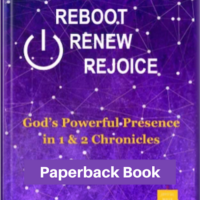2 Chronicles 22-25 • The Deception of Halfhearted Obedience

AI was not used to generate this post.
When you obey an authority, do you do it begrudgingly because you have to obey? That would be half-hearted obedience. Or do you obey from the heart because you want to obey that authority in obedience to God? In the last post, we looked at looked at the benefits that come to us when we choose to stay true to our spiritual heritage and not compromise with the world. This is post #9 in the Chronicles blog series. In this article, we will see the deception of half-hearted obedience to the Lord. Joash is our example.
Key Takeaways
- The article explores the theme of half-hearted obedience through the biblical figure Joash.
- Joash, raised under the influence of a faithful mentor, initially conformed to God’s commands but lacked genuine commitment.
- After the death of his mentor, Joash turned away from God, influenced by the officials of Judah and his family’s wicked legacy.
- The author emphasizes that outward conformity cannot replace heartfelt obedience to God, which leads to true spiritual growth.
- Joash’s story serves as a warning about the dangers of half-hearted obedience, both for him and his descendants.
Listen to this post as a similar podcast from our Reboot Renew Rejoice Bible Study covering the books of 1 and 2 Chronicles in the Old Testament. (11 lessons)
The Halfway Covenant
In 1630, a group of 1,000 Puritan refugees from England settled the Massachusetts Bay Colony in present-day Massachusetts. Deeply committed to God, they sought to form a colony that was under God’s sovereignty. Only those who had experienced a genuine conversion to Christ with evidence in their lives of being saved could be members of the church and voting members of the community. But as life went on, those very faithful Christians began to die.
By the 1660’s, it became evident that the younger generation was drawn to the materialistic success of the growing towns and not as interested in being saved and living out their Christian life. Therefore, they could not become official church members and voting participants in the community. Yet, those descendants of the godly Puritans did not want to abandon their faith completely. They still wanted their children to be baptized as part of God’s community.
So, a group of ministers in Boston came up with a compromise known as the Halfway Covenant. This allowed the children to be baptized even if their parents were not saved. The hope was that the children would grow up and want to be saved themselves and become church members. This compromise rewarded halfhearted obedience. And nothing good can come out of that. We see that in the life of King Joash.
Joash, the Boy King
I remember the first time I read about Joash, the boy who became king of Judah as a 7-year-old. When our children were young, we read from the Muffin Family Bible Series every night as a family. One night we read about Joash, and his story fascinated me.
Joash’s grandmother Athaliah was the daughter of wicked Queen Jezebel and King Ahab of the northern kingdom of Israel. Like her parents, she was a committed Baal worshiper. When her son Ahaziah king of Judah died, Athaliah declared herself to be queen of Judah. The first decision she made was to kill all her grandchildren! Oh my! This woman had no heart at all!
She proceeded to destroy the whole royal family of the house of Judah … (2 Chronicles 22:10)
How could she do that! It baffles me how wicked people can be—even mothers. Throughout 2 Chronicles, we can see that “it matters who your mama is.”
But Jehosheba, the daughter of King Jehoram, took Joash son of Ahaziah and stole him away from among the royal princes who were about to be murdered and put him and his nurse in a bedroom. Because Jehosheba, the daughter of King Jehoram and wife of the priest Jehoiada, was Ahaziah’s sister, she hid the child from Athaliah so she could not kill him. He remained hidden with them at the temple of God for six years while Athaliah ruled the land. (2 Chronicles 22:11-12)
Thankfully, the toddler Joash had been hidden away in the temple by his Aunt Jehosheba (Ahaziah’s sister from another mother) and Uncle Jehoiada who was the High Priest. Keeping a small child hidden at the Temple for 6 years was no small feat! Perhaps Aunt Jehosheba passed him off as her own child. We do not know what they did to hide his identity. But when Joash was brought out 6 years later and presented to the people as their king, apparently there was no question as to whether he was really the former King Ahaziah’s son. Yet, even if Joash were the king’s sister’s child, he was still David’s descendant. God’s promise to maintain David’s throne was preserved.
Joash was presented to the people during one of the three festival times.
Jehoiada and his sons brought out the king’s son and put the crown on him; they presented him with a copy of the covenant and proclaimed him king. They anointed him and shouted, “Long live the king!” (2 Chronicles 23:11)
Apparently, the worship of the Lord had been banned in favor of Baal worship in Jerusalem. So, a festival time might have been deemed a safe time for the people to gather without creating a stir in wicked Queen Athaliah’s mind. The coup was successful. Athaliah was executed, and the people worshiped the Lord again openly. Hooray!
Even in his late 80s, Uncle Jehoiada was a better mentor for Joash than his own father would have been so God did not need Ahaziah alive. But why leave wicked grandmother alive? It might have been so that Joash would be a bit older and not just a toddler when he took the throne. Probably presenting Joash still in diapers and saying, “Here is your king” would not go over very well. And maybe the people needed to experience Athaliah’s wickedness to prepare their hearts to accept a 7-year-old as their next king.
By now, I think they trusted Jehoiada. He was a great High Priest. Powerful. Faithful to God. He was running the show as Joash grew up. And he did a great job because Joash did what was right in the eyes of the Lord all the years of Jehoiada the priest. Joash put a lot of effort into repairing the temple during his early years as king. As long as Jehoiada lived, Joash outwardly conformed to God’s commands (2 Chronicles 24:1-14). But where was his heart during that time?
Joash’s True Heart Revealed
Jehoiada died at the ripe old age of 130. I am thinking God kept him alive and kicking for Joash’s benefit.
Half-heartedness covered by conformity
After he died, Joash turned from God. His DNA from wicked great-grandparents, a wicked grandmother, and a wicked father kicked in! But he was not alone in his fickleness in serving God. That is what surprised me so much!
After the death of Jehoiada, the officials of Judah came and paid homage to the king, and he listened to them. They abandoned the temple of the Lord, the God of their ancestors, and worshiped Asherah poles and idols. Because of their guilt, God’s anger came on Judah and Jerusalem. Although the Lord sent prophets to the people to bring them back to him, and though they testified against them, they would not listen. (2 Chronicles 24:17-19)
The officials of Judah influenced a now 47-year-old King Joash to abandon the temple of the Lord and to worship Asherah poles and idols instead. That tells me Joash was only conforming on the outside all those years. His heart was not touched though he had the best mentor he could have had. And God kept sending communications all those years to the king and to the people. They were not left without a continual word from the Lord. Yet, they would not listen!
Half-heartedness is self-determined
Half-heartedness is self-determined. God is constantly wooing. The Spirit of God came upon Jehoiada’s son Zechariah (not the author of the book by that name). This is the message for Joash from God,
Why do you disobey the Lord’s commands? You will not prosper. Because you have forsaken the Lord, the Lord will forsake you. (2 Chronicles 24:20)
Instead of repenting, King Joash ordered Zechariah to be executed!
King Joash did not remember the kindness Zechariah’s father Jehoiada had shown him but killed his son, who said as he lay dying, “May the Lord see this and call you to account.” (2 Chronicles 24:22)
King Joash did not remember the kindness Zechariah’s father had shown to him and chose to kill his son. Yes, Joash killed his own cousin—the son of the uncle who saved his life! That is ungratefulness!
God’s judgment on Joash came swiftly. He was executed by the end of the year by his own officials who hated what he had done to Zechariah. At least someone was paying attention.
Halfhearted Obedience Was Modeled and Adopted
Sadly, Joash’s son Amaziah was not much better. In 2 Chronicles chapter 25, we read this,
He did what was right in the eyes of the Lord, but not wholeheartedly. (2 Chronicles 25:2)
That sounds like his dad. Joash’s halfhearted obedience was modeled to his son who adopted that response to God as well. Like father, like son.
Early in his reign, Amaziah made a rash decision to hire mercenaries from Israel. A prophet came to him and said not to do it because God would not give him success in battle. Amaziah obeyed and sent those guys back home.
Even if you go and fight courageously in battle, God will overthrow you before the enemy, for God has the power to help or to overthrow.” Amaziah asked the man of God, “But what about the hundred talents I paid for these Israelite troops?” The man of God replied, “The Lord can give you much more than that.” So Amaziah dismissed the troops who had come to him from Ephraim and sent them home. They were furious with Judah and left for home in a great rage. (2 Chronicles 25:8-10)
Amaziah led Judah’s army to victory in another battle, this time with the people of Seir. I could not believe what I read next.
When Amaziah returned … he brought back the gods of the people of Seir. He set them up as his own gods, bowed down to them and burned sacrifices to them. The anger of the Lord burned against Amaziah, and he sent a prophet to him, who said, “Why do you consult this people’s gods, which could not save their own people from your hand?” (2 Chronicles 25:14-15)
Amaziah brought the gods of the defeated people to his house and started worshiping them. Say what?! Why worship the gods that lost the battle? They could not save their own people. Worshiping them is illogical!
Amaziah ruled for another fifteen years. He was hated by the people of Jerusalem (probably for that idol worship) and then assassinated by them. God carried out His judgment through others. That fifteen-year wait allowed a one-year-old son named Uzziah to grow up and be old enough to rule at age sixteen. The sovereign God had His plan.
Both Joash and his son Amaziah did what was right in their younger years. But even then, it was not done wholeheartedly. We see the deception of their halfhearted obedience. We see the deception of outward conformity because outward conformity does not change the heart.
Outward Conformity Does Not Change the Heart
Half-heartedness is self-determined. And it is deceptive. It makes you think that you are being good when you obey sometimes, especially in behavior visible to onlookers. But when the outward pressure to obey or restraints are removed, the true nature of a man or woman is revealed.
The danger of legalism
That is why legalism is so dangerous to Christians. Legalism is trying to earn or maintain God’s acceptance by one’s performance. That would include following human “religious” laws imposed by others or even self-imposed rules that you feel make you more spiritual than others or acceptable to others. But when you are forced to show outward conformity to religious laws, you are actually drifting your focus away from the person of Jesus Christ. You will be straying from enjoying a relationship with the one who loves you dearly to practicing a religion that might make you look good.
God wants obedience from the heart
Here is a key truth: The heart relationship with God is primary over behavior. God wants your heart first. Only the power of God’s presence will change a heart. Jesus Christ deserves your loyalty. Loyalty requires humility. Humility leads to obedience from the heart.
I heard an illustration many years ago that I have never forgotten.
A mother was driving to school one day, and her youngest child was standing in the seat beside her. Realizing the danger, she said to him, “Sit down, dear, I may have to stop suddenly and you’ll be thrown against the windshield.” “No!” the little boy refused. “Please sit down, dear, I don’t want you to get hurt,” the mother insisted. “No!” came the stubborn reply. Finally, she reached over and pulled him down. He sat there sullenly for a moment, then said, “I may be sitting down on the outside, but I’m standing up on the inside.”
How often we respond to authority that way. We submit to it on the outside, but inside we are saying, “I resent it.”
God does not want our outward compliance. He wants our obedience from the heart. That is true for earthly parenting as well. The goal should not be outward compliance but true obedience from the heart. That same goal holds true for discipling new Christians. Establish someone in a love relationship with their God, and they will want to live a life that pleases Him out of love and gratitude for what He has done for them. Otherwise, you might get halfhearted obedience—sitting down on the outside, but standing up on the inside.
God Offers Himself
As we have seen throughout our study of Chronicles, God is constantly wooing us. He continually offers us Himself and the power of His presence in our lives. Today, we get that through knowing Christ Jesus. Pastor Tony Evans calls Jesus “God’s selfie.” When you know Jesus, you know God. When you have Jesus in your life, you have the presence of God in your life.
Let Jesus satisfy your heart with the power of His presence. Then, live in that power!
Read all the articles in our 1 and 2 Chronicles series. In the next post, we will see that depending on God subdues that boastful pride of life that can infiltrate our hearts as we grow older.
All of the above information is covered in the Reboot Renew Rejoice Bible Study of 1 and 2 Chronicles.
AI was not used to generate this post.


